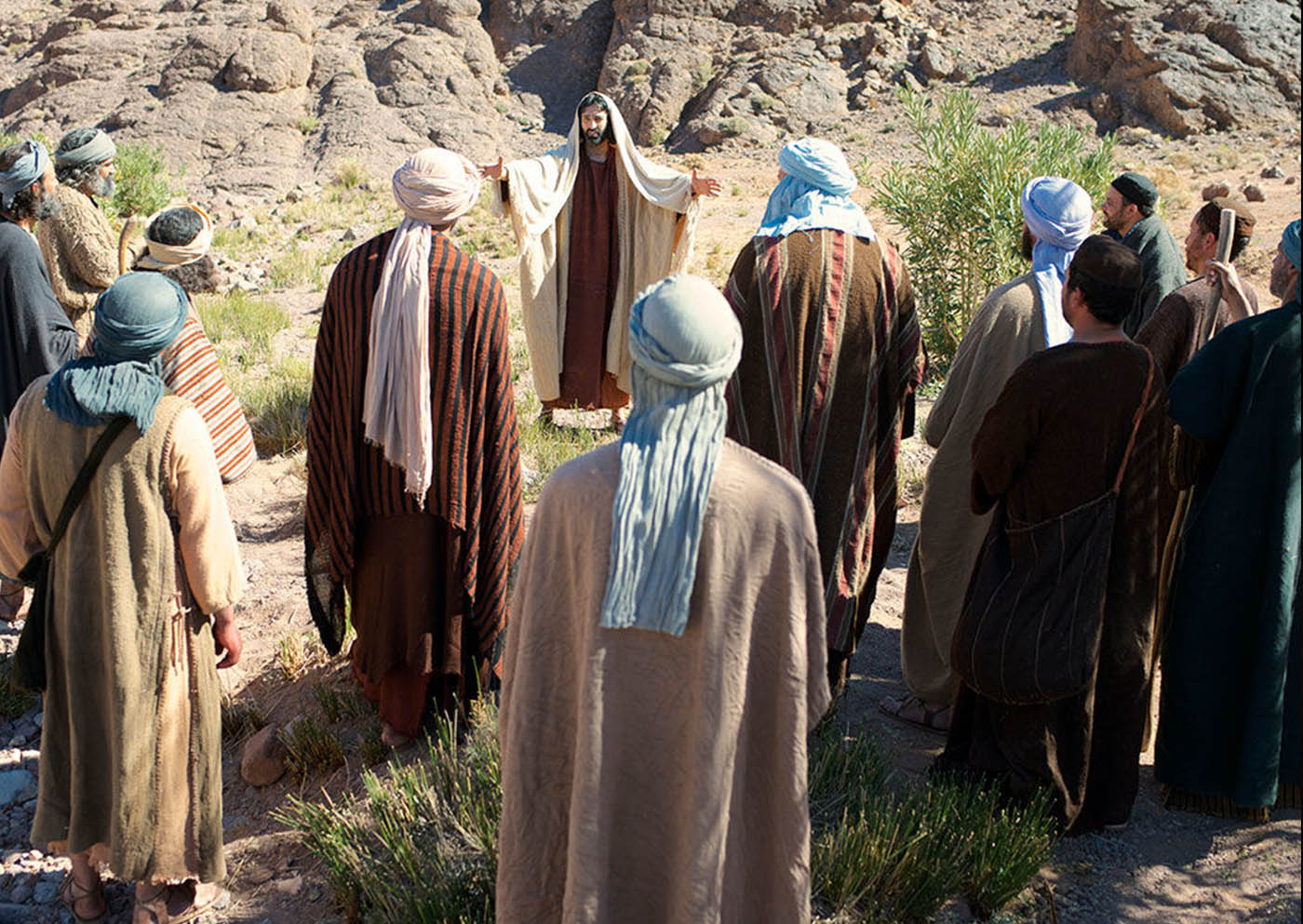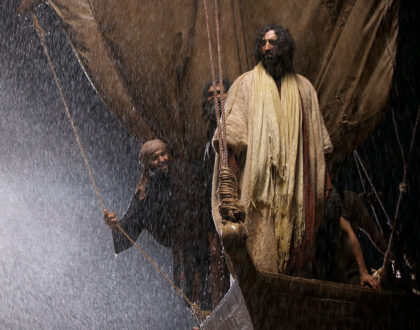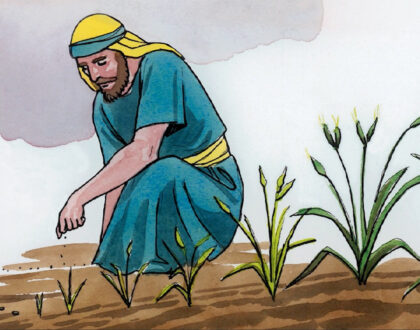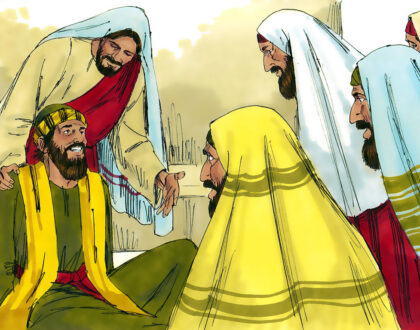Using The Gifts For God’s Glory

“Using The Gifts For God’s Glory”
Archbishop Loren Thomas Hines
First Sunday in Ordinary Time
June 18, 2017
Readings: Exodus 19:2-8, Psalm 100
Romans 5:6-11
Matthew 9:35-10:8
Perhaps not by accident, today is Father’s Day just as we begin Ordinary Time because it is in honor of the Father that we proclaim His love and realize that our whole life is dependent upon Him, and we live our lives in submission to Him. The proclamation today and the rest of the year is we honor our Father by living lives of thanksgiving to Him for all that He has done for us. It’s appropriate that we give that honor to the Father, not just in words but in everything we do. None of us can exist without the Father’s involvement. He sets the course and direction for our lives. He gives to us all that we need – His protection and provision – overseeing and giving life in procreation. It’s the reason why God created us – to reproduce. The world today tells us to do the opposite, but God wouldn’t have instructed us to multiply and fill the earth unless He knew that it could be done if we walk in the provisions of God.
In the over 400 years of Israel’s slavery to Egypt, we see that every time Israel complained, Egypt became more difficult to deal with. When the Israelites complained that they were working too hard (producing so many bricks a day), Egypt demanded even more of them. Life became increasingly difficult for Israel in all the years of their captivity, yet they were prolific and continued to grow in number. In the midst of trouble, instead of decreasing they became even more abundant. This became a cause of concern for the Egyptians because they were afraid that Israel would overtake them in number and cause an uprising, so they made life even harder for them. Moses was born under circumstances that prevented him from staying alive unless his mother did something illegal. But all these happened to show God’s compassion, grace and mercy. Even if He allowed the difficulties upon Israel because of their disobedience, He delivered them from Egypt’s captivity. He brought a curse upon Egypt, causing them to lose all their first born sons, their wealth and their military might. God allowed all these to happen to save His people and bring them out of Egypt, taking them across the Red Sea with many signs and wonders that Israel witnessed and experienced. There was a mighty manifestation of the power of God to bring His people out of bondage and slavery and God asked Moses to remind the people of their redemption, of how joyfully they celebrated when God delivered them from the Egyptian army in the Red Sea. However, after a few years they forgot. This is typical of humanity; we forget all that’s been given to us to bring us where we are today. We’ve become self-centered, not taking what’s been given us and cause them to grow. God asked Moses to tell the sons of Israel, “If you will indeed obey My voice and keep My covenant, then you shall be My own possession among all the peoples, for all the earth is Mine; and you shall be to Me a kingdom of priests and a holy nation” (Exodus 19:5-6). We have taken this statement and made a song out of it, but we don’t pay attention to the fact that God said we shall be a kingdom of priests and a holy nation only if we don’t forget Him and if we obey Him and keep His covenant. Today, we are like Israel back then. We forget what God has done for us. We claim that we are a royal priesthood, a holy nation, God’s own people, but we go on and do our own thing. Look back to Advent, Christmas, Epiphany, Lent, Easter and Pentecost; God gave us all these for our benefit, to prepare us to do the work that will bring glory and honor to Him. If we work for a company that will invest in our training and then after a time we become lazy and do not deliver what’s expected of us, we may be dismissed for not doing what we’re being paid to do. We’ve become self-centered. It’s true that there are evil employers who exploit their employees; on the other hand, we have learned to demand for our rights and expect to be protected, not fired. Rather than giving, we now demand. We’re not thankful for the family that built the corporation to provide employment because we only think of ourselves.
This is what God wants us to look at as we begin Ordinary Time. Look at how much God has done for us: “For while we were still helpless, at the right time Christ died for the ungodly” (Romans 5:6). We were rebellious. We even crucified the One who came to save us. He redeemed us and brought us back to the family of God. He blessed us. Read Ephesians 1 to see all that now belongs to us because of His love for us. What are we doing with them? Do we reach out to others that they too may know how much God loves them? God demonstrated His love to us by sending His only Son. Who would do this? Who would be so committed to his people that he would allow his son to die on their behalf? Yet this is the love and compassion that God has for us. He has justified us, made us holy and blameless, not because of anything we have done. He has erased our records in the book; the page with our name on it is empty because of what He has done. Do we realize this? Are we thankful? Are we thankful for the sun that rises in the morning, for the rain that waters the earth so it can produce food for us, or do we complain about the heat and the rain? Are we thankful for the rest He gives us? When we wake up in the morning, are we ready to face the day and say, “This is the day that the Lord has made. Something good will happen today”? Or do we grumble about the work we have to do and the people we have to face? We have forgotten to become a people who are grateful for everything that God has given us. We have received reconciliation with the Father because of the work of Christ; we’re now part of the family of God. Do we recognize that and show it in the way we live? Do we live like the royal priesthood? We are challenged to use the gifts He has given us to help others and touch their lives.
In the Gospel today in Matthew 9, Jesus was ministering to the people – proclaiming the Gospel and healing the sick. He felt compassion for them because they were distressed, downcast, bewildered, harassed, dejected, helpless, weary, scattered, a people with no direction, purpose and reason for existence. They were like sheep without a shepherd. This was why they were following Jesus. They felt His compassion, His concern about their physical condition and their well-being. Jesus knew that they weren’t happy. They left the city and followed Him because they sensed His heart of love and compassion. They didn’t see this in the Pharisees and Sadducees whose legalism put them in bondage and slavery that they had no peace and joy. Jesus was concerned for the people and this made Him say to His disciples that “the harvest is plentiful but the workers are few. Therefore beseech the Lord of the harvest to send out workers into His harvest” (Matthew 9:37). He is the Father of all creation and He’s concerned about His people. Jesus was reflecting the heart of the Father. He sensed the needs of the people and was compassionate towards them because they were hurting and not getting any help from leadership; they were not being taken cared of. So He summoned the disciples and gave them authority over unclean spirits and gave them the ability to heal every kind of disease and sickness. He commissioned His disciples to be His representatives to humanity. The disciples weren’t just those He was addressing; the disciples include us. He’s also giving us the responsibility to be an instrument of healing and deliverance for others. How many times do we see someone in difficulty and we say they deserve it? If we all get what we deserve, we’ll all be in pain, but Christ’s compassion lifts us up and gives us hope, and having received these gifts He now asks us to have the same compassion for others and give them hope. The world around us is hurting. The suicide rate is on the rise, especially among the young people. They have no hope, nothing to look forward to. We think we’re advancing in our societies with the advances in technology that allows us to fly to anywhere in the world and talk face-to-face with anyone in the world, but we find ourselves with no peace, security and joy. Joy comes in taking care and touching the lives of others because when we do this, we’ll have the mercy of God ourselves.
In Exodus 34, the Lord said to Moses, “Cut out for yourself two stone tablets like the former ones, and I will write on the tablets the words which were on the former tablets which you shattered”. He instructed Moses to come up to Mount Sinai in the morning, so Moses did as God instructed him and “the Lord descended in the cloud and stood there with him as he called upon the name of the Lord”. Israel had failed God; Moses came down the mountain the first time and broke the stone tablets containing the commandments because of Israel’s rebellion. But God called him back to bring the commandments to the people that they may know that God loves them, even if they rebelled against them. God wants us to be instruments of peace even to those we don’t agree with; those we want to get away from.
Numbers 27:17 “Who will go out and come in before them, and who will lead them out and bring them in, so that the congregation of the Lord will not be like sheep which have no shepherd.” This speaks of the compassion that we should have for others that they may know that peace comes from knowing God. We should be experiencing this peace ourselves with all that God has done for us, but if we don’t use it, it turns sour within us and instead of enjoying the peace we get easily irritated. God has blessed all of us with tremendous abilities but when we use them only for our own benefit, their benefits will not be realized to the fullest. You may think that your gift won’t fit in helping others but if you use it because you want to give praise to God, it won’t matter what your gift is. If you have a sari-sari store, are you there solely to make a profit or are you there to meet the needs of the neighborhood, not taking advantage of them but serving them for the glory of God? The Pharisees and Sadducees were abusing the people. They were taking even from the widows and orphans to enrich themselves, instead of taking care of them. Jesus was saying that this isn’t how He wants us to be. Ordinary Time is when we put into practice all that He’s given us. He has forgiven us and now He wants us to forgive. He has blessed us and now He wants us to bless others. Be there for others who are facing difficulties. We have many excuses for not helping, but you don’t have to do “great” things. Pray for them. You may be physically handicapped in some way or you don’t have the means to help, but you can pray for them. This is what Ordinary Time is. It’s not for us to sit back, glory in the blessings of God and say, “Thank You, Jesus!” That thanks may not even reach the ceiling because it’s not being manifested; but when it’s manifested, you don’t have to say much because action speak louder than words. That’s what Ordinary Time is – paying attention to what God has done for us. If we’re thankful for them, we won’t be happy unless we pass on the blessings to others, to meet their needs.
I found this reading from a homily of John Chrysostom, bishop of Constantinople, that’s so appropriate for today:
“Nothing is more frigid than a Christian who is not concerned with saving others. You cannot in this respect plead poverty: the woman who contributed her last two copper coins to the collection box will rise up to accuse you. So will Peter who said: “I have neither silver nor gold”, and Paul who was so poor that he often went hungry for lack of necessary food. Neither can you point to your humble birth: for they were also little people of the lower class. Ignorance will serve as no better excuse for you: they also were unlettered. Even if you are a slave or a fugitive, you can still do your part; such was Onesimus, and look to what he was called. And do not bring up infirmity: Timothy was subject to frequent illness. No matter who you are, you can be useful to your neighbor if you are willing to do what you can.
Do you see how sturdy, fair, well-shaped, graceful, and magnificent are the trees that do not bear fruit? Yet if we have occasion to possess a garden, we prefer pomegranate and olive trees filled with fruit. Sterile trees are there for appearance rather than utility; and if they can be useful, it is only in a very limited way. Such are those persons who consider only their interest. And such persons do not even attain this end, for they are good only to be rejected, whereas the trees can be used to build houses. The foolish virgins had purity, grace and modesty, but they were not useful to anyone because they saw themselves rejected.
Such also are those persons who do not assuage Christ’s hunger. Note well that none of them is reproached for private sins – fornication, perjury and the like – but only for not having been useful to others. I ask you, is someone who acts in this fashion a Christian? If the leaven mixed with the flour does not cause it to rise, is it truly leaven? If perfume does not have a pleasing fragrance for those who come near, do we call it perfume?
Do not say that it is impossible to lead others into the fold, for if you are a Christian it is impossible not to do so. Indeed if it is true that there is no contradiction in nature, what we have said is just as true, for it stems from the very nature of a Christian. If you claim that a Christian cannot be useful, you dishonor God and behave like a liar. It is easier for light to be darkness than for a Christian not to send forth light. Do not declare something impossible when it is the contrary that is impossible. Do not dishonor God.”
John Chrysostom wrote this hundreds of years ago. If he were alive today, he’ll have more to say because we have become a very selfish people. As Christians, we can’t be selfish; we have to give of ourselves. As John Chrysostom said, we may not have money, but it doesn’t take money or education to bless and help others. It may only be a few words that we say to someone who’s hurt or a few coins we drop on the collection box. It may be something simple, but it could be the thing that will change someone’s life. We are to be instruments for the glory of God. True, we’re human; we have feelings and there are times when we’re tired, stumble and fall, but we don’t stay there. We rise up. God doesn’t want us to be idle worshippers. He wants us to be active in our service. There must be something in each of us that gives us the ability to give praise to God. Maybe we can’t be what others are. Maybe we can only do something simple, but if it’s what God has given us, we use it. This will cause things to happen. Sometimes it’s the “little” ones that do the most. I remember in my childhood, there was a lady in our church whose husband was a drunkard and made life hard for her. But she was the most loving, sweetest person who worked hard to take care of her family. People with problems would go to her for prayer. She was humble but she was also one of the most powerful persons in the church. She was persecuted in her own home but that didn’t stop her from being one who loved and acted in compassion. She baked the best pies and cakes and gave them in love to others. What she did wasn’t major but their effects were far-reaching. Each of us is given opportunities to fulfill what God has given us. Remember what John Chrysostom said: nothing’s more frigid than a Christian who’s not concerned for others. We’re feeding the poor because we’re concerned for them. It’s a simple thing we do for them but it could make a big difference in their lives. They may rise up someday to become givers themselves.
The call to us in Ordinary Time is to use what God has given us, whatever it may be, for His honor and glory. 1 Corinthians tell us that everyone of us has been given a gift, without exception. Know what God has given you and use it for His glory and honor. This is Ordinary Time, not ordinary according to the world’s standard but ordinary according to the Kingdom of God. So let’s make it magnificent, great and beautiful to give thanks to God for all that He has given us.
Recent Sermons

Jesus, Calmer Of Storms
June 23, 2024

Harvest Time Stemming From The Smallest Seed
June 17, 2024

Not Bound By Limitations To Minister
June 10, 2024

